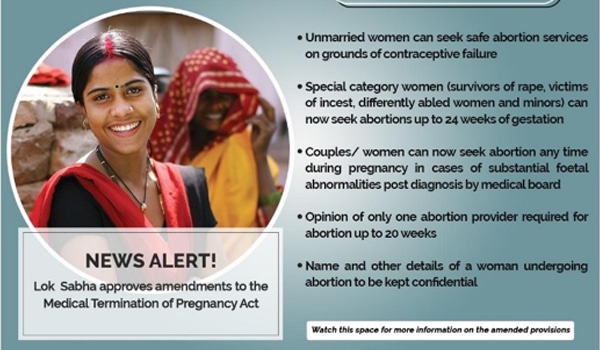
TheGovernment of India passed the Medical Termination of Pregnancy amendment bill on17 March 2020 in the lower house of India’s parliament.A report of thestatements made by members reveals hopes for this law reform that are highlyunlikely because of the limited changes it permits, for example: “TheBill will bring about socio-economic change and give a woman reproductiverights,” said Dr Shrikant Eknath Shinde (Shiv Sena). Chandeshwar Prasad (JD(U))said, “The Bill will ensure women will not employ quacks for pregnancytermination procedures and hence reduce unsafe terminations. Othersacknowledged its limitations, for example: “The Bill places the doctors in thecentre of the decision for abortion and does not consider the right to abortionas a fundamental right of a woman,” said Ritesh Pandey (BSP).
The Ipas infographic above shows that the following clauses wereadded to the existing law:
– Unmarried women can now seek abortion due to contraceptivefailure. In the original law, only married women could do so as it was assumedonly married women had sex.
– Survivors of rape and incest, differently abled women andminors can seek abortion up to 24 weeks.
– Abortion ca be sought at any time in pregnancy on groundsof substantial fetal anomaly.
– Opinion (sic) of only one doctor (instead of two) neededfor abortions up to 20 weeks.
– Woman’s name and personal details to be confidential.
Perhapsthe most vexing and problematic part of the new law is that it mandates the conveningof medical boards by each state and union territory government, to consist of agynaecologist, radiologist or sonologist, paediatrician, and “such other numberof members as may be notified in the Official Gazette by the State Governmentor Union territory…” This Board will serve “the purposes of this Act toexercise such powers and functions as may be prescribed by rules made underthis Act.”Or, to put it more simply, assuming they continue to play therole they have been playing up to now (and this is not yet said), they willhave the power to give permission for any abortion over 20 weeks. As theseboards do not yet exist in many places, forming them will delay implementingthe new clauses and may serve as real blocks to increased access.
Thus,the group Hidden Pockets expressed dismay at the outcome, because thegovernment refused to listen to the recommendations of activists and academicssupporting abortion rights. They say the most important continuing problem isthat doctors will “continue to be the ultimate yes/no person who willdecide whether the woman can have her abortion” no matter what her age. Theyreport:
“We have documented doctors extorting eye wateringcharges from unmarried women for medical termination of pregnancy and somedoctors have even threatened to call the parents of young adults who wanted anabortion. Perhaps we need to double check on the authority which the law hasbestowed on the doctors and that it can be misused for harassment and profits,especially when the women are in a vulnerable state…. We are equallysaddened by the fact that amidstall the conversations around public healthand corona, the law does not take intoconsiderationany of the problemswith current laws.”
The full text of the bill has not yet been released.Meanwhile, there are still 13 deaths from unsafe abortions daily in India,reports Health Issues India.
SOURCES: The Hindu, 17 March 2020 ; Hidden Pockets, by Nishitha AyshaAshraf, 17 February 2020 ; HealthIssues India, by Keren Watts, 19 March 2020



